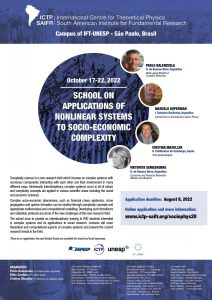School on Applications of Nonlinear Systems to Socio-Economic Complexity
October 17-22, 2022
São Paulo, Brazil
ICTP-SAIFR/IFT-UNESP

Home
Complexity science is a new research field which focuses on complex systems with numerous components interacting with each other and their environment in many different ways. Intrinsically interdisciplinary, complex systems occur in all of nature and complexity concepts are applied in various scientific areas including the social and economic sciences.
Complex socio-economic phenomena, such as financial crises, epidemics, crime propagation and opinion formation can be studied through complexity concepts and appropriate mathematical and computational modelling. Developing such formalisms and validation protocols are some of the new challenges of this new research field.
The school aims to provide an interdisciplinary training to PhD students interested in complex systems and its applications to social research. Lectures will cover theoretical and computational aspects of complex systems and present the current research trends in the field.
There is no registration fee and limited funds are available for travel and local expenses.
For information about previous activities related to the series “Topics in Nonlinear Dynamics: Fundamentals and Applications”, please visit the websites:
- School in Nonlinear Optics and Nanophotonics (2013)
- School on Complex Networks and Applications to Neuroscience (2015)
- School on Nonlinear Time Series Analysis and Complex Networks in the Big Data Era (2018)
Information for 2020 applicants: If you are still interested in participating, please review and update your submission HERE. If you are not able to participate in the school, please cancel your application by accessing your previous submission HERE, clicking on “View Details”, and choosing the option “Cancel my application”.
Satisfaction survey:
- click HERE
Lecturers:
- Pablo Balenzuela (Universidad de Buenos Aires, Argentina): Multi-agent Models in Complex Networks
[PROGRAM] - Marcelo Kuperman (Instituto Balseiro-Bariloche, Argentina): Introduction to Evolutionary Game Theory
[PROGRAM] - Cristina Masoller (Universidad Politécnica de Catalunya, Spain): Time Series Analysis
[PROGRAM] - Viktoriya Semeshenko (Universidad de Buenos Aires, Argentina): Economic and Financial Networks: Models and Analysis
[PROGRAM]
Organizers:
- Pablo Balenzuela (Universidad de Buenos Aires, Argentina)
- Hilda Cerdeira (IFT-UNESP, Brazil)
- Cristina Masoller (Universidad Politécnica de Catalunya, Spain)
Program
School Program: PDF updated on October 18, 2022
Registration
Photos
Videos and Files
- 09:30 - Cristina Masoller (Universidad Politécnica de Catalunya, Spain): Time Series Analysis - Class 1 of 4
- 10:15 - Pablo Balenzuela (Universidad de Buenos Aires, Argentina): Multi-agent Models in Complex Networks - Class 1 of 4
- 11:30 - Viktoriya Semeshenko (Universidad de Buenos Aires, Argentina): Economic and Financial Networks: Models and Analysis - Class 1 of 4
- 12:15 - Marcelo Kuperman (Instituto Balseiro-Bariloche, Argentina): Introduction to Evolutionary Game Theory - Class 1 of 4
- 09:30 - Marcelo Kuperman (Instituto Balseiro-Bariloche, Argentina): Introduction to Evolutionary Game Theory - Class 2 of 4
- 10:15 - Cristina Masoller (Universidad Politécnica de Catalunya, Spain): Time Series Analysis - Class 2 of 4
- 11:30 - Viktoriya Semeshenko (Universidad de Buenos Aires, Argentina): Economic and Financial Networks: Models and Analysis - Class 2 of 4
- 12:15 - Pablo Balenzuela (Universidad de Buenos Aires, Argentina): Multi-agent Models in Complex Networks - Class 2 of 4
- 09:30 - Viktoriya Semeshenko (Universidad de Buenos Aires, Argentina): Economic and Financial Networks: Models and Analysis - Class 3 of 4
- 10:15 - Pablo Balenzuela (Universidad de Buenos Aires, Argentina): Multi-agent Models in Complex Networks - Class 3 of 4
- 11:30 - Cristina Masoller (Universidad Politécnica de Catalunya, Spain): Time Series Analysis - Class 3 of 4
- 14:00 - Marcelo Kuperman (Centro Atómico Bariloche - Instituto Balseiro): The destructive effect of human stupidity: a revision of Cipolla's fundamental laws
- 09:30 - Marcelo Kuperman (Instituto Balseiro-Bariloche, Argentina): Introduction to Evolutionary Game Theory - Class 3 and 4
- 11:30 - Cristina Masoller (Universidad Politécnica de Catalunya, Spain): Time Series Analysis - Class 4 of 4
- 09:15 - Pablo Balenzuela (Universidad de Buenos Aires, Argentina): Multi-agent Models in Complex Networks - Class 4 of 4
- 09:30 - Viktoriya Semeshenko (Universidad de Buenos Aires, Argentina): Economic and Financial Networks: Models and Analysis - Class 4 of 4
asdasdasd
Additional Information
List of Participants: Updated on October 21, 2022
BOARDING PASS: All participants, whose travel has been provided by ICTP-SAIFR, should bring the boarding pass upon registration. The return boarding pass (PDF, if online check-in, scan or picture, if physical) should be sent to secretary@ictp-saifr.org by e-mail.
Visa information: Nationals from several countries in Latin America and Europe, Australia, Canada, Japan and USA are exempt from tourist visa. Please check here which nationals need a tourist visa to enter Brazil.
Accommodation: Participants, whose accommodation will be provided by the institute, will stay at The Universe Flat. Hotel recommendations are available here
COVID-19: Fully vaccinated Brazilians and foreigners are now exempt from presenting proof of a COVID-19 test with a negative or non-detectable result. You are only required to present proof of vaccination, printed or electronically.
How to reach the Institute: The program will be held at ICTP South American Institute, located at IFT-UNESP, which is across the street from a major bus and subway terminal (Terminal Barra Funda). The address which is closer to the entrance of the IFT-UNESP building is R. Jornalista Aloysio Biondi, 120 – Barra Funda, São Paulo. The easiest way to reach us is by subway or bus, please find instructions here.

